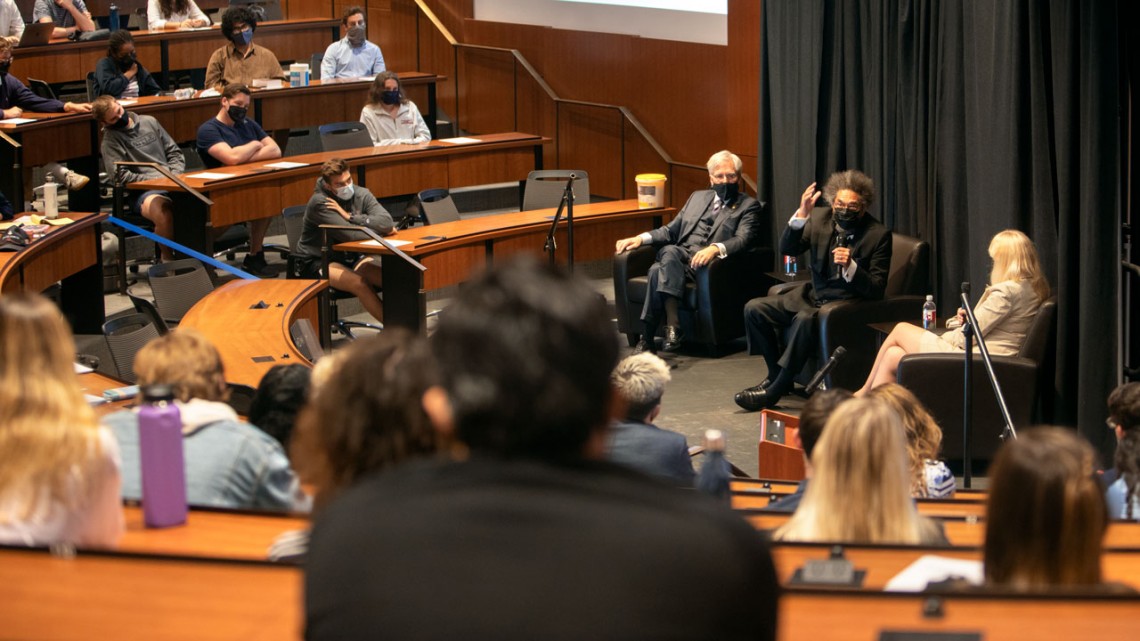
Cornel West, the Dietrich Bonhoeffer Chair at Union Theological Seminary, speaks Sept. 9 during the fourth installment of Civil Discourse: The Peter ’69 and Marilyn ’69 Coors Conversation Series. To West’s right is co-speaker Robert P. George, the McCormick Professor of Jurisprudence and director of the James Madison Program in American Ideals and Institutions at Princeton University.
West, George defend academic freedom in Coors forum
By James Dean
Democracy and the search for truth require a willingness to challenge our most fundamental beliefs and accept criticism of them, a pair of prominent scholars argued during the fourth installment of Civil Discourse: The Peter ’69 and Marilyn ’69 Coors Conversation Series, hosted Sept. 9 by Cornell Law School.
The speakers, Cornel West and Robert P. George, said a commitment to those principles means not settling for social and media networks that reinforce our own viewpoints. It means that colleges and universities – whose mission is truth-seeking and non-indoctrinating teaching – should ensure faculty members who disagree on important issues engage with each other, they said, and that students hear perspectives they may find offensive.
“We can only pursue truth if we do so with an open mind and with a critical and self-critical spirit,” said George, the McCormick Professor of Jurisprudence and director of the James Madison Program in American Ideals and Institutions at Princeton University. “If we go into our silos, if we’re unwilling to hear criticism, if we take it all personally, we will not be able to sustain a democracy.”
“The quest for truth is self-critical,” said West, the Dietrich Bonhoeffer Chair at Union Theological Seminary. “But it’s an attempt to make sure that we do not engage in easy complicity and complacency and conformity to what is in place, status quos that will not tell the truth.”
The Civil Discourse conversation series aims to foster greater understanding across differences by bringing together speakers with a range of political viewpoints on difficult yet timely issues.
“I firmly believe that the need for civility increases proportionally as our disagreements become sharper,” said Jens David Ohlin, the Allan R. Tessler Dean of Cornell Law School. “It is when we disagree that we must strain to engage with each other in ways that are both productive and broad-minded.”
Sheri Lynn Johnson, the James and Mark Flanagan Professor of Law at Cornell Law School, moderated the 80-minute discussion on “Truth-Seeking, Democracy, and Freedom of Thought and Expression,” held in the Landis Auditorium in Myron Taylor Hall and livestreamed. Watch a replay here.
The conversation’s theme echoed the title of a statement West and George – longtime friends with different political ideologies – co-authored in 2017 following a high-profile incident at Middlebury College, in which students protested and disrupted an event featuring a conservative speaker.
Johnson asked the scholars how their views on free speech and academic freedom applied to some other events that have made headlines, such as Harvard University’s 2019 decision not to renew a law professor’s position as head of a residential house, following a student backlash against his role on Harvey Weinstein’s defense team.
“I believe that every citizen deserves a vigorous defense in the (legal) system,” West said, who is a friend of the professor, Ronald Sullivan. “The passion that (the students) had in terms of ensuring that women are treated with dignity is very important ... but they’re just wrong.”
“If students don’t like what they’re hearing from that professor, or don’t like what that professor has said in a law review article or in a speech, let them challenge it, let them criticize, let’s have a conversation,” George said. “There shouldn’t be ‘safe spaces’ … where I will not be challenged.”
A few ground rules govern truth-seeking discourse, George and West said: Offering reasons, making arguments and citing evidence to support one’s views, not hurling insults.
The duo modeled civil discourse during an exchange about America’s founding principles. West said the nation was founded on a lie that all are created equal, while systematically disenfranchising Indigenous, Black and white people without property. George responded that the principles set forth in the Declaration of Independence and Constitution (perfected through amendments) were noble, and our failure was infidelity to them in practice.
“Our unifying commitment is to a principle, the basic American constitutional principles,” George said. “I think we should be able to affirm those and then criticize our failings as failings to live up to the principle.”
“The ideal of human dignity is not an American principle, it’s a human principle,” West said. “There are abstract interpretations of that which sound well on paper, but people still catching hell as the structures of domination are crushing them.”
Threats to free speech and expression come from the left and right, George said, ranging from the Middlebury incident to some recent efforts to ban the teaching of critical race theory – “a straight-out attack on civil liberty,” he said.
Asked by a student when to speak truth to power, West said to be “jazz-like” and find the right timing, to exercise practical wisdom, and to develop a trusted network not based solely on ideology – like his friendship with George. Even inspirational civil rights leaders weren’t all aligned ideologically, he said, citing strategic differences between Thurgood Marshall and Martin Luther King Jr.
“But what brought them together was their attempt to hold on to a quest for truth, and the condition of truth is always to allow suffering to speak,” West said. “What brought them together was a quest for integrity.”
The next Coors Conversation, scheduled Oct. 28, will feature George Will and Martha Nusbaum discussing the future of Division I college athletics.
Media Contact
Get Cornell news delivered right to your inbox.
Subscribe
